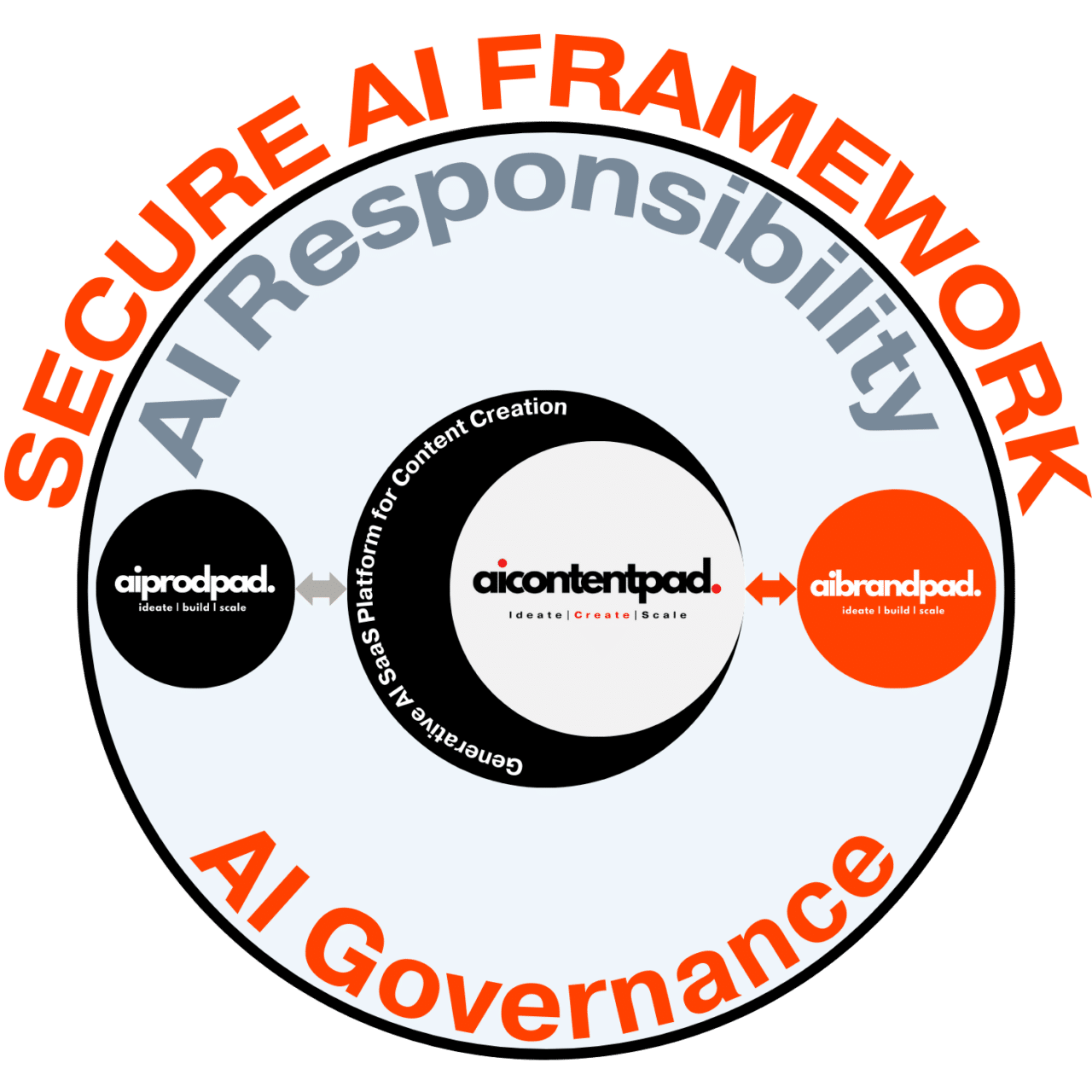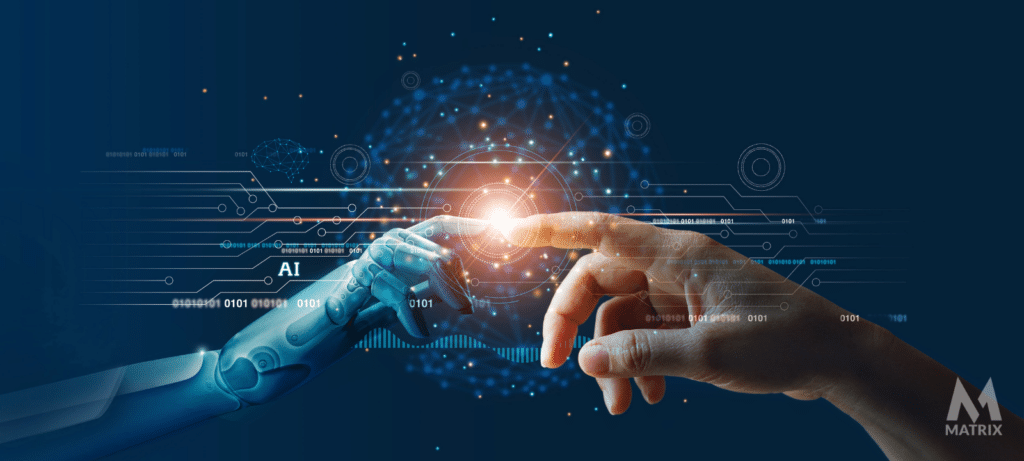Artificial Intelligence Marketing: The New AI Digital Marketing Agency
Learn About all the Fuss About Artificial Intelligence Marketing: The New AI Digital Marketing Agency.
Artificial intelligence marketing (AI marketing) is a form of marketing that uses artificial intelligence (AI) concepts and models to achieve marketing goals. AI can automate tasks, analyze data, and personalize marketing messages.
There are many ways that AI can be used in marketing. For example, AI can be used to:
- Automate tasks: MatrixAI can automate email marketing, social media marketing, and lead generation tasks. This can free up marketing teams to focus on more strategic tasks.
- Analyze data: MatrixAI can analyze large amounts of data to identify trends and patterns. This information can be used to improve marketing campaigns and target marketing messages more effectively.
- Personalize marketing messages: AI can be used to personalize marketing messages to each customer. This can help to increase engagement and conversion rates.
AI marketing is a rapidly growing field, and there are many new and innovative ways that AI is used in marketing. As AI develops, AI marketing will become even more sophisticated and effective.
Here are some examples of how AI is being used in marketing today:
- Amazon: Amazon uses AI to recommend products to customers based on their past purchases and browsing history.
- Netflix: Netflix uses AI to recommend movies and TV shows to customers based on their viewing habits.
- Spotify uses AI to create personalized customer playlists based on their listening habits.
- Facebook: Facebook uses AI to target ads to users based on their interests and demographics.
- Google: Google uses AI to personalize search results for users.
These are just a few examples of how AI is used in marketing today. As AI develops, AI marketing will become even more sophisticated and effective.
Brief History of AI in Marketing
Artificial intelligence (AI) has been used in marketing for decades, but only in recent years has AI become a mainstream marketing tool.
The first use of AI in marketing can be traced back to the early 1960s when IBM developed a computer program called ELIZA that could simulate human conversation. ELIZA was used by marketers to test new advertising copy and to gather feedback from customers.
In the 1970s, AI was used to develop marketing software that could automate customer segmentation and lead generation tasks. This software helped marketers save time and money, allowing them to focus on more strategic tasks.
In the 1980s, AI was used to develop marketing research software to analyze large amounts of data to identify trends and patterns. This information helped marketers to improve their marketing campaigns and to target their marketing messages more effectively.
In the 1990s, AI was used to develop marketing automation software that could automate email marketing, social media marketing, and lead generation tasks. This software helped marketers to free up time to focus on more strategic tasks.

In the 2000s, AI was used to develop marketing analytics software to track marketing campaigns’ performance and identify improvement areas. This information helped marketers to optimize their marketing campaigns and to get better results.
In the 2010s, AI has become a mainstream marketing tool. Marketers now use AI to automate tasks, analyze data, personalize marketing messages, and track the performance of marketing campaigns.
As AI continues to develop, AI will likely become even more sophisticated and effective in marketing. AI will likely play a major role in marketing, and marketers need to understand how AI can improve their marketing campaigns.
- Automating tasks: AI can automate email marketing, social media marketing, and lead generation tasks. This can free up marketing teams to focus on more strategic tasks. Here are some of the ways that AI is being used in marketing today:
- Analyzing data: AI can analyze large amounts of data to identify trends and patterns. This information can be used to improve marketing campaigns and to target marketing messages more effectively.
- Personalizing marketing messages: AI can be used to personalize marketing messages to each customer. This can help to increase engagement and conversion rates.
- Tracking the performance of marketing campaigns: AI can be used to track the performance of marketing campaigns and identify improvement areas. This information can be used to optimize marketing campaigns and to get better results.
AI is a rapidly growing field, and there are many new and innovative ways that AI is used in marketing. AI marketing will become even more sophisticated and effective as AI develops.
The Importance of AI in Modern Marketing

Artificial intelligence (AI) is becoming increasingly important in modern marketing. AI can automate tasks, analyze data, and personalize marketing messages. This can help marketers to save time and money, improve the effectiveness of their marketing campaigns, and better understand their customers.
AI is a rapidly growing field, and there are many new and innovative ways that AI is used in marketing. As AI develops, AI marketing will become even more sophisticated and effective.
Here are some of the benefits of using AI in marketing:
- Increased efficiency: AI can automate many marketing tasks, allowing marketers to focus on more strategic activities.
- Improved targeting: AIProdPad helps marketers target their marketing messages more effectively, increasing conversion rates.
- Increased personalization: AIContentPad helps marketers personalize their marketing messages to each customer, resulting in higher engagement and loyalty.
- Improved decision-making: AI can help marketers make better decisions about their marketing campaigns based on data and insights.
AI is a powerful tool that can help marketers improve their marketing campaigns and achieve their business goals. If you still need to start using Ausearketing, now is the time.
Do you want to keep up with the latest in marketing technology trends? Have you heard about the power of Artificial Intelligence Marketing but don’t know where to start?
Let us introduce you to MatrixAI – the only AI digital marketing agency that provides a comprehensive solution for connecting potential customers through data-driven insights and advanced targeting techniques. Our proprietary platform enables marketers to improve customer engagement by providing tailored messaging across email, web, social media, and ad campaigns.
The goal is to increase visibility and create meaningful relationships across various public spaces.
With our AI-powered services, such as audience segmentation and personalized content creation, along with automation procedures like creative optimization & dynamic ad splits, we can help achieve improved ROI at scale without additional overhead – making it easier than ever for businesses of all sizes to adopt AI into their existing marketing stack.
Learn how MatrixAI’s cutting-edge Artificial Intelligence capabilities can revolutionize your digital presence and build better relationships between your brand and its customers!
I. Introduction to Artificial Intelligence Marketing
In recent years, we have witnessed a significant rise in adopting Artificial Intelligence (AI) in various fields to achieve outstanding results.
AI marketing is the latest buzzword that encapsulates the utilization of this technology to enhance marketing strategies. It allows businesses to gather valuable insights into customer behavior, preferences, and purchasing trends, blurring the lines between personalized and generic marketing.
The adoption of AI marketing technology has proven to be cost-efficient. Businesses can achieve targeted strategies to improve customer engagement, generate leads, and increase sales.
A. Definition of Artificial Intelligence Marketing
Artificial Intelligence (AI) Marketing is a digital marketing strategy that uses AI technology to analyze consumer behavior and preferences to understand their needs better and deliver targeted, personalized content. This approach uses complex algorithms, machine learning, and natural language processing to automate many marketing tasks, making it possible to create efficient and effective campaigns.
By leveraging the power of AI, businesses can gain a deeper understanding of their customers, optimize their marketing strategies, and ultimately drive better results.
AI Marketing is an innovative and forward-thinking approach to digital marketing, and it is quickly becoming an indispensable tool for businesses looking to stay ahead of the competition.
B. Brief History of AI in Marketing
Artificial intelligence has been transforming the marketing field for quite some time. Its history dates back to the mid-20th century when the first attempts to simulate intelligent behavior began.
Researchers were eager to develop machines to solve complex problems or emulate human-like skills, such as language understanding and pattern recognition. By the 90s, the rise of the internet brought a wealth of data and opened new opportunities for AI in marketing.
Today, algorithms can mine massive amounts of customer data, predict consumer behavior, personalize advertisements, and more. AI has proven to be a game-changer for marketers, delivering tangible benefits such as increased revenue, improved customer engagement, and reduced costs.
As we move forward, the importance of AI in the marketing landscape is only set to grow, and businesses that embrace it are likely to gain a competitive edge.
C. The Importance of AI in Modern Marketing
With technological advancements, marketing has also evolved to become smarter and more efficient than ever. At the heart of this transformation lies Artificial Intelligence (AI).
AI has brought new accuracy and effectiveness to modern marketing strategies. With the ability to analyze vast amounts of data and make sense of patterns and behaviors, AI has the power to revolutionize the marketing industry.
From predicting customer behavior to personalizing the user experience, AI is helping marketers stay ahead of the game and drive revenue. In today’s fast-paced and competitive business environment, AI has become an indispensable tool for any marketer looking to stay relevant and succeed in their industry.
II. Understanding Artificial Intelligence
Artificial Intelligence (AI) has become a very common term and is considered one of our most significant technological advancements.
But what exactly is AI, and how does it work? Simply put, AI is the simulation of human intelligence in machines programmed to think and learn like humans. It is the science and engineering of creating intelligent machines that can perform tasks that usually require human intelligence, such as decision-making, language translation, speech, image recognition, and much more.
AI has the potential to revolutionize many aspects of our lives, from healthcare to transportation, and we must continue to learn more about this fascinating technology.
A. Key Concepts in Artificial Intelligence
Artificial Intelligence is no longer just a futuristic idea as it continues to gain momentum and shape our daily lives in countless ways. Key concepts that lay the foundation for its practical applications are essential to the development and advancement of AI.
These include machine learning, natural language processing, computer vision, and robotics. Machine learning is the backbone of modern AI, allowing machines to learn from data and improve their performance over time.
Natural language processing enables machines to understand written or spoken language and respond appropriately. Computer vision allows machines to “see” and interpret visual data, while robotics involves the development of machines that can perform physical tasks with human-like dexterity.
With these key concepts in mind, the potential for AI to revolutionize our world is exciting, and the possibilities are seemingly endless.
1. Machine Learning
Machine learning is revolutionizing the world we live in. This cutting-edge technology can analyze vast amounts of data and provide insights that traditional methods cannot match.
With machine learning, computers can learn and improve from experience, adapt to new data, and become more accurate and efficient. The potential applications of this technology are limitless – from self-driving cars and personalized medicine to fraud detection and speech recognition.
Machine learning transforms how we approach problem-solving and opens up opportunities for businesses and individuals alike.
2. Natural Language Processing
Natural Language Processing (NLP) is a rapidly growing field in technology. NLP refers to how machines can understand and interpret human language.
This technology has many practical applications, such as language translation, sentiment analysis, and speech recognition. One crucial aspect of NLP is the output language code. EN-US, for example, stands for English (United States).
This code allows NLP systems to recognize the language and provide appropriate responses or translations. As the capabilities of NLP continue to expand, it will surely transform how we interact with technology and each other.
3. Deep Learning

Deep learning is a field of artificial intelligence that can make sense of complex data sets. Its neural network system can recognize patterns and organize information to mimic the human brain’s work.
This level of sophistication has sparked widespread interest in the field, with deep learning algorithms applied to everything from self-driving cars to image recognition. The technology has become so valuable that Google has invested heavily in deep learning, building an entire division dedicated to research and development.
With its ability to make critical decisions based on vast amounts of data, deep learning paves the way for a new era of intelligent machines.
B. The Evolution of AI Technologies
Artificial Intelligence (AI) technologies have come a long way since their inception.
From voice assistants like Siri and Google Assistant to self-driving cars, robots that can perform complex tasks and machines that can learn and improve independently, AI has evolved by leaps and bounds.
Today’s AI systems can analyze vast amounts of data and provide insights that would be impossible for humans to obtain manually. AI’s possibilities are endless, and it’s exciting to think about the potential advancements we’ll see shortly.
C. How AI Works in Marketing
In today’s marketing landscape, AI isn’t just a buzzword, and it’s a powerful tool that is changing the game. AI can analyze vast amounts of data, identify patterns and preferences, and provide deep insights into consumer behavior.
By utilizing AI in marketing, businesses can drive more personalized and targeted campaigns, leading to higher conversion rates and increased ROI. From chatbots to predictive analytics, AI transforms how marketers approach their craft.
Companies of all sizes are investing in AI-powered marketing solutions, and it’s not hard to see why. As technology continues to evolve, it’s clear that AI will play an increasingly important role in shaping the marketing landscape of the future.
III. Benefits of AI in Marketing

Artificial Intelligence has revolutionized the way businesses reach their potential customers. With AI, marketers can analyze user behavior, predict trends, and make informed decisions that maximize their reach and sales.
This technology streamlines identifying potential customers by tracking their online activities and tailoring personalized content to their interests. It also allows marketers to make data-driven decisions, identify inefficiencies and stay ahead of the curve.
The advantages of AI in marketing extend beyond just the collection and analysis of data; it helps brands understand their customer preferences, enhance brand loyalty and ultimately generate revenue.
The use of AI in marketing not only optimizes marketing strategies but also provides a rich customer experience, which is vital for any business to succeed in today’s digital world.
A. Personalization and Customization
The world is changing fast, and the way we interact with technology. We all want products and services tailored to our individual needs and preferences. This is where personalization and customization come in.
The rapid pace of modern technology has led to the automated and continuous collection of data, whether a customer is online or offline. This results in significantly larger amounts of data being created than ever before.
As you shop, data collection happens at the point of purchase in-store and online checkout. Meanwhile, behind the scenes and beyond the shopping experience, cookies, beacon tech, retargeting pixels, and Internet of Things (IoT) devices all work in concert to collect information.
Today, thanks to big data and AI, all this information can be gathered, processed, and analyzed – and, more importantly, used by businesses immediately.
The big data and AI era has revolutionized how information is collected, processed, and analyzed – empowering businesses to utilize it instantly.
Companies are trying to provide customized experiences in every aspect of our lives, from the clothes we wear to the food we eat and even the tools we use. Personalization is the key to creating a unique experience for every individual, and it’s becoming increasingly important for businesses looking to stand out in a crowded market.
With personalization, we can enjoy products, services, and experiences that truly resonate with us, making our lives easier and more enjoyable. Customization is the future; we can’t wait to see what’s in store.
B. Customer Segmentation
As businesses grow, it becomes important to understand their customers’ behavior and preferences properly. This is where customer segmentation comes in.
Customer segmentation is a technique that separates customers into groups based on their characteristics and behavior. It is a vital aspect of marketing and allows businesses to tailor products and services that resonate with their customer’s needs.
Marketers can develop targeted strategies and campaigns that appeal to each group’s unique interests and preferences by segmenting customers into groups. This ensures that the right message reaches the right people at the right time, ultimately increasing customer satisfaction and loyalty.
Customer segmentation is valuable for any business looking to stay ahead of the competition and deliver top-notch customer experiences.
C. AI Predictive Analytics for revenue improvement
With technological advancements, businesses are turning towards AI predictive analytics to find new ways to increase revenue.
Using machine learning algorithms enables companies to analyze vast amounts of data to identify potential revenue growth opportunities.
The insights generated from this analysis help businesses optimize their sales processes and also help them make informed decisions about product pricing, marketing strategies, and customer relationships.
By leveraging the power of AI predictive analytics, companies can create personalized experiences for their customers, leading to increased loyalty and higher revenue streams. AI predictive analytics has become indispensable for businesses looking to stay ahead of the pack and maximize their revenue potential.
D. Automation of Repetitive Tasks
Automation of repetitive tasks is revolutionizing industries. From manufacturing to finance, automation has the power to increase efficiency and productivity while reducing costs dramatically.
Using technology, repetitive tasks like data entry, invoice processing, and quality control inspections can be completed faster and with fewer errors.
This frees up time for employees to focus on higher-level tasks and improves the quality of work produced. As businesses continue to explore the possibilities of automation, it’s clear that it has the potential to transform the way we work completely.
While some may fear that automation will result in job loss, it’s important to remember that it simply shifts the focus from menial tasks to more complex and creative ones. The future of work is here, and it’s looking brighter than ever.
E. Improved Customer Interactions and Engagement
In today’s digital age, businesses must go the extra mile to keep their customers engaged and satisfied. Improved customer interactions and engagement are key to fostering strong relationships between businesses and their patrons.
By providing exceptional customer service and personalized experiences, businesses can build customer trust, loyalty, and advocacy. Whether through social media channels, email, or in-store interactions, businesses must strive for seamless and meaningful communication with their customers.
Understanding their needs and preferences and providing tailored solutions can go a long way in ensuring a positive customer experience. When customers feel valued and heard, they are more likely to return and recommend a business to others, which is vital for long-term success.
Investing in improved customer interactions and engagement is a win-win for businesses and their customers.
Are You Concerned with AI Governance?
Learn about AI in Corporate Governance before It’s Too Late
AI Corporate Governance is essential for any successful business in today’s digital age. As a CEO in this highly competitive landscape, you can’t afford to overlook Artificial Intelligence (AI) and its impact on your organization’s overall success and strategies.
With powerful capabilities ranging from automating manual processes to improving decision-making capabilities and forecasting risk more accurately, utilizing an AI corporate governance approach has become critical for large companies worldwide.
IV. Key AI Technologies Used in Marketing
Artificial intelligence (AI) is transforming how businesses do marketing. With technological advancements, marketers can gather better data insights and personalize customer experiences like never before.
AI is revolutionizing the marketing industry, enabling companies to create hyper-targeted campaigns and increase customer satisfaction.
Key AI technologies used in marketing include natural language processing (NLP), which allows chatbots and voice assistants to interpret data such as images and videos and analyze social media sentiment.
A. Chatbots and Virtual Assistants
Chatbots and virtual assistants are revolutionizing how we interact with technology. From helping us order pizza to provide weather updates, these intelligent bots are changing the game regarding convenience.
One of the most amazing things about chatbots and virtual assistants is their ability to learn and adapt to our behaviors and needs.
They can recognize speech patterns and even remember our preferences to provide us with a more personalized experience. As technology evolves, it’s exciting to see how chatbots and virtual assistants will continue to shape and improve our daily lives.
B. Programmatic Advertising Platforms
In today’s digital landscape, businesses must be strategic with advertising efforts. Programmatic advertising platforms have become popular for companies looking to streamline their ad campaigns and reach their target audience more effectively.
With programmatic advertising, ads are placed in real-time through automated processes, allowing businesses to optimize their advertising efforts and target specific demographics.
By utilizing advanced algorithms and machine learning, programmatic advertising platforms can tailor ads for individual users, increasing the likelihood of engagement and conversions. This method has proven incredibly successful, and experts predict that programmatic advertising will continue to grow in popularity in the years ahead.
C. Recommendation Engines
In today’s digital age, recommendation engines have become integral to many industries, such as e-commerce, streaming services, and digital advertising.
These AI-powered engines are designed to analyze user behavior, preferences, and purchase history to generate personalized recommendations. By providing relevant suggestions to users, these engines enhance the user experience and increase customer retention and satisfaction.
With the help of recommendation engines, businesses can offer tailored content to their customers, resulting in more conversions and, ultimately, increased revenue. Recommendation engines have revolutionized how businesses interact with customers, creating a more personalized and engaging experience.
D. Predictive Analytics Tools
The rise of predictive analytics tools has transformed how businesses operate. These tools can use complex algorithms and machine learning to identify patterns and predict based on past data.
This allows companies to make informed decisions, improve their products and services, and ultimately increase their bottom line. Businesses use these tools across various industries to gain a competitive advantage, from predicting customer behavior to identifying potential fraud.
While these technologies can be complex, their ability to uncover previously buried insights has made them an indispensable resource for modern-day businesses looking to stay ahead of the curve.
E. Customer Relationship Management (CRM) Systems
In today’s fast-paced business world, having an effective customer relationship management (CRM) system is more important than ever.
A good CRM system allows you to manage your customer interactions and helps you stay competitive. By providing important data about your customers, such as their preferences and buying habits, a CRM system lets you personalize your approach and provide them with tailored experiences that will keep them coming back for more.
By optimizing customer relations, businesses can also enhance their productivity and profitability. In short, investing in a quality CRM system is a must for any enterprise looking to take its customer interactions to the next level.
Language has always been a crucial component of human communication. Over time, different languages have evolved, developed, and spread worldwide.
Today, there are over 7,000 languages spoken globally, each with its unique structure, grammar rules, and accents. For this reason, language has become an essential tool for connecting people from diverse backgrounds and cultures.
However, communicating in a foreign language can be challenging, especially for non-native speakers. Fortunately, technology has come a long way in developing language tools to help people overcome language barriers and communicate effectively.
With the output language code EN-US, people can now easily translate text and voice into English, making communication smoother and more efficient.
V. AI in Different Areas of Marketing
As the marketing field continues to evolve, so does the role of artificial intelligence (AI) in helping businesses drive growth and improve customer experiences.
From chatbots that can provide instant customer service to data analysis tools that track consumer behavior, AI is making its presence felt across various marketing activities. In the world of e-commerce, AI is being used to personalize recommendations and streamline the checkout process, while in advertising, it is helping companies identify the most effective strategies for reaching their target audiences.
As these technologies continue to improve and expand, it’s clear that AI will play an increasingly important role in shaping the future of marketing and advertising.
A. AI in Social Media Marketing and MatrixAI
The intersection of artificial intelligence and social media marketing has led to a game-changing new technology called MatrixAI.
This innovative software allows brands and marketers to harness the power of AI to analyze massive amounts of data and create personalized, targeted marketing campaigns that resonate with their audiences.
MatrixAI can help streamline the marketing process by automating data collection and analysis tasks, freeing marketers to focus on strategy and creativity.
With AI continuing to make strides in digital marketing, the possibilities for brands to connect with consumers on a deeper level are endless.
B. AI in Email Marketing
Artificial Intelligence (AI) has revolutionized various industries recently, and Email Marketing is no exception. The advent of AI has transformed the way organizations advertise, sell, and interact with customers through email marketing campaigns.
Unlike traditional email marketing, AI-powered emails are much more personalized and relevant to the customers’ needs and preferences.
With AI, marketers can collect and analyze user data to create tailor-made content and design to target specific customer segments. Additionally, AI can automate email campaigns, making the marketing team’s job much more comfortable and efficient.
The future of Email Marketing is undoubtedly intertwined with AI, and those who leverage it will reap significant benefits in the long run.
C. AI in Content Marketing
In today’s world, content marketing has become essential for businesses to attract and engage their target audience. With the advancements in technology, the role of artificial intelligence (AI) in content marketing has become increasingly relevant.
By leveraging AI tools, businesses can optimize their content strategies and gain a competitive edge in the market. AI can help marketers identify the content that resonates with their target audience, personalize content recommendations for individual users, and generate relevant and interesting content.
As AI technology continues to evolve, we can expect it to become an even greater force in the world of content marketing, helping businesses better connect with their audience and drive growth.
D. AI in Search Engine Optimization
The impact of Artificial Intelligence (AI) on Search Engine Optimization (SEO) has been significant over the past few years.
AI has allowed companies to optimize their websites for search engines, leading to increased traffic and higher rankings. Using algorithms, AI can analyze large amounts of data and identify patterns s might miss. This allows businesses to create effective content strategies tailored to their target audience.
As AI continues to evolve, it will become increasingly important for businesses to stay up-to-date with the latest technological advancements in SEO. By embracing AI and using it to their advantage, companies can stay ahead of the competition in the digital marketplace.
E. AI in Advertising
Artificial intelligence has revolutionized how we interact with the world around us, and advertising is no exception.
With the vast amount of data available today, AI has enabled companies to target their ads accurately. By analyzing consumer behavior, search history, and demographic information, AI algorithms can create personalized experiences that resonate with users on a deeper level.
This benefits advertisers who can achieve better ROIs and enhances the user experience as ads become more relevant and less intrusive. From chatbots that simulate human interaction to predictive analytics that inform ad placement, AI is changing the face of advertising as we know it.
VI. Case Studies: Successful Applications of AI in Marketing
Artificial intelligence has become increasingly popular in marketing as businesses look to streamline their processes and better target their audience.
Many successful case studies prove just how beneficial AI can be in marketing. For instance, some companies have used AI-powered chatbots to improve customer service and response times.
In contrast, others have utilized predictive analytics to understand consumer behavior better and tailor their marketing efforts to meet their specific needs. By utilizing AI in marketing, businesses can save time and resources while improving their overall success.
Ultimately, AI opens up new possibilities for businesses looking to stay ahead of the game in a constantly evolving market.
A. Case Study 1 for the technology brand using Artificial Intelligence Marketing under 500 million in sales
Technology is rapidly evolving today, and companies are trying to keep up with the changing times. Artificial Intelligence Marketing is the latest buzzword that has caught the attention of business owners.
One such company that has implemented AI in its marketing strategy is a technology brand that boasts sales of under 500 million dollars.
With the help of AI, they have been able to understand their customer’s behavior and preferences better. The company has created personalized ads and content that resonates with its target audience using this technology.
This has resulted in increased customer engagement and sales for the brand. It is a perfect example of how even small and medium-sized businesses can leverage the power of AI to achieve their marketing goals.
B. Case Study 2 for advanced manufacturing companies using Artificial Intelligence Marketing under 500 million in sales
Innovations in advanced manufacturing techniques and Artificial Intelligence (AI) has significantly impacted how companies approach their marketing strategies.
Case Study 2 highlights how AI Marketing can benefit companies with sales under 500 million dollars. Businesses can use predictive analysis, customer segmentation, and targeted advertising by implementing AI algorithms and machine learning capabilities.
By utilizing AI-driven campaigns, companies can leverage accurate insights into their customers’ behaviors and buying patterns, delivering tailored marketing with a much better return on investment.
Integrating AI Marketing into a business strategy enables organizations to achieve better results while streamlining their marketing processes for more effective operations.
C. Case Study 3 for a financial firm using Artificial Intelligence Marketing under 500 million in sales
Artificial Intelligence has revolutionized how businesses conduct their marketing efforts. One case study that highlights this phenomenon is that of a financial firm implementing AI marketing strategies.
With sales under 500 million, this firm has significantly leveraged AI to improve its marketing operations.
By automating processes such as customer segmentation, analysis of consumer trends, and predicting customer behavior, the firm has identified opportunities for growth and improved engagement.
This has translated into more effective marketing campaigns, increased customer satisfaction, and ultimately boosted their bottom line. I
Indeed, AI has proven to be a game-changer for companies looking to remain competitive in an increasingly complex business environment.
VII. Potential Challenges and Ethical Considerations of AI in Marketing
As AI continues to evolve, it is becoming more prevalent in marketing. But with its increased use comes potential challenges and ethical considerations that must be considered.
One challenge is ensuring that AI does not perpetuate bias and stereotypes in the marketing messages it generates. Another issue is protecting consumer privacy and preventing the misuse of personal information.
Additionally, companies must consider the potential negative impact of AI on employment and the potential loss of jobs. Ethical considerations also come into play in determining how AI is used in marketing and ensuring that it is not used in a manipulative or harmful way.
While AI can benefit the marketing industry, these potential challenges and ethical considerations must be carefully addressed.
A. Data Privacy Issues
In today’s digital age, data privacy has become more important. With the growing amount of personal information being collected and shared, individuals are increasingly concerned about how their data is used.
From social media platforms to online retailers, organizations are under scrutiny for their data privacy policies and practices.
Several high-profile data breaches and scandals have further amplified the need for stronger data privacy regulations and protections in recent years.
As we navigate this ever-evolving landscape, individuals and organizations must remain vigilant in protecting personal information and staying informed about the latest data privacy developments.
B. Over-reliance on Automation
Technology has revolutionized how we work and communicate, but with every advancement comes a certain level of risk and concern.
Over-reliance on automation is one such risk gaining traction in recent years. While automation undoubtedly improves efficiency and productivity, it can also result in human workers being replaced by machines.
It’s important to balance automation and the need for human input and oversight. Finding the sweet spot where technology enhances human productivity rather than replaces businesses must remain competitive to sustain viability.
C. Ethical Considerations for AI Marketing
Ethics should always play a significant role when making decisions in any field. The same goes for working in the technological industry, where the implications of certain choices can have real-world consequences.
Ethical considerations consider a decision’s impact on others and the potential long-term effects.
In the world of tech, it’s essential to factor in issues such as the privacy of individuals, protection against discrimination, and fair use of data.
As we continue to advance technologically, we must ensure that our decisions are ethical and mindful of how they affect society. Ultimately, it’s not just about protecting individuals but striving for a better future where technology serves everyone equitably.
D. Skills and Training Requirements
In today’s dynamic job market, having the right skills and training to stay relevant and competitive is essential.
Skills and training requirements are crucial for starting your career or looking to take the next step. With technological advances and globalization shaping the workforce, employers emphasize skills and qualifications more.
Therefore, staying up-to-date with industry standards and trends is vital to ensure job security and career growth.
Many resources are available to help job seekers and professionals acquire the skills and training required to excel in their roles, including online courses, workshops, and mentorship programs.
Investing in oneself by acquiring new skills and engaging in professional development activities is a recipe for success in today’s ever-evolving job market.
Our professionals at MatrixLabs and MatrixAI use these generative AI programming languages:
- GPT-3: GPT-3 is a large language model developed by OpenAI. It is one of the most powerful generative AI models available, and it can be used to generate text, translate languages, write different kinds of creative content, and answer your questions in an informative way.
- Code-GPT: Code-GPT is a generative AI model developed by OpenAI. It can generate code in various programming languages, including Python, Java, JavaScript, and C++.
- GitHub Copilot: GitHub Copilot is a generative AI tool developed by GitHub. It can generate code in various programming languages, including Python, Java, JavaScript, and C++.
- Bard: Bard is a large language model developed by Google AI. It can generate text, translate languages, write different kinds of creative content, and answer your questions in an informative way.
- Cohere Generate: Cohere Generate is a generative AI tool developed by Cohere. It can generate text, translate languages, write creative content, and answer your questions informally.
These are just a few of the many generative AI programming languages available. As generative AI develops, we can expect to see even more powerful and versatile tools become available.
VIII. Future Trends in AI Marketing
As technology advances, so too do the possibilities of AI in marketing. Already, businesses are using AI to analyze customer behavior and create personalized recommendations.
In the future, we can expect AI to push the boundaries even further. With natural language processing and sentiment analysis, AI can interpret customer feedback in real time and adjust marketing strategies accordingly. Virtual assistants will become even more prevalent, assisting customers with everything from product queries to order tracking.
And as we see increasing adoption of smart home technology, AI will be able to predict and anticipate consumer behavior, allowing marketers to deliver the right message to the right person at the right time.
Overall, the future of AI marketing holds endless possibilities for personalized experiences and increased customer satisfaction.
A. The Emergence of AI-Powered Marketing Technologies

The world of marketing is constantly evolving.
The emergence of AI-powered marketing technologies is revolutionizing how businesses approach their marketing strategies.
With the help of machine learning algorithms, companies can now analyze consumer data with precision, enabling them to understand and predict customer behavior like never before.
This means that businesses can create highly-customized messages and experiences that are both relevant and valuable to their target audience. From chatbots to predictive analytics, these technologies are transforming the marketing landscape, making it more efficient, effective, and personalized than ever before.
As we move forward, we can expect to see even more advancements in AI-powered marketing that will further enhance the customer experience for years to come.
B. Integration of AI with Other Emerging Technologies
Artificial Intelligence is proving to be a game-changer in various fields. The integration of AI with other emerging technologies is bound to have a significant impact on society. One such collaboration is between AI and the Internet of Things (IoT).
As devices become smarter and interconnected, combining AI and IoT will lead to the development of smart homes and cities. The healthcare industry is another area where AI is being integrated with technology.
The use of AI-infused robots in surgery has already yielded success, making it a more reliable and less invasive alternative. Integrating AI with other emerging technologies have endless possibilities, and it will be fascinating to see how it shapes the future.
C. The Impact of AI on the Future of Work in Marketing
Artificial intelligence, or AI, is rapidly changing the marketing landscape, and its impact on the future of work cannot be ignored.
With AI becoming more sophisticated, marketing professionals must adapt and keep up or risk being left behind.
This innovation is expected to dramatically change the way marketers operate, from analyzing data to predicting consumer behavior and everything in between.
However, the integration of AI in marketing doesn’t necessarily mean that it will push human expertise aside. It can work harmoniously with human intuition and creativity, enabling marketers to provide their audiences with more targeted and personalized content.
Marketers need to embrace and understand the changes AI brings, as it can take marketing efforts to a whole new level and revolutionize the industry as we know it.
IX. Conclusion about Artificial Intelligence Marketing
In conclusion, the fast-paced technological advancements have revolutionized the marketing industry by introducing Artificial Intelligence marketing.
Companies can now leverage AI-based marketing techniques to understand their customers better, predict their behavior, and improve customer experience.
Integrating AI-driven chatbots and virtual assistants has added a new level of convenience to the consumer.
As AI technology evolves, businesses have enormous potential to unlock more gains from their marketing efforts, such as better targeting, increased efficiency, and ROI. As we move forward, it’s safe to say that Artificial Intelligence marketing is the marketing industry’s future.
A. Recap of the Significance of AI in Marketing
Artificial Intelligence (AI) has revolutionized how businesses implement marketing strategies. The technology has enabled companies to design more targeted campaigns that are both cost-efficient and yield better results.
AI-powered tools can collect huge amounts of data in real-time, enabling marketers to build accurate customer profiles and understand their behavior patterns.
Through these insights, companies can devise personalized marketing campaigns that resonate with their target audience, leading to increased engagement, conversions, and sales. You can save this article artificial intelligence in marketing pdf.
The use of AI in marketing not only saves valuable time and resources but helps businesses stay up-to-date with the latest trends, build brand loyalty, and gain a competitive edge in the marketplace.
B. Final Thoughts and Projections for the Future
As we conclude our discussion, it’s important to reflect on the insights we’ve gained and consider what the future may hold.
The world constantly changes, and staying on top of the latest developments is crucial. Looking ahead, we may see technological advancements that reshape industries, new challenges and opportunities in global politics, and continued progress toward a more sustainable planet.
Yet, amidst these changes, it’s important to remember that people will always be at the heart of progress. By maintaining empathy, fostering connections, and working together towards common goals, we can create a brighter future for everyone.
In conclusion, Artificial Intelligence Marketing has much to offer businesses of all sizes. It provides valuable insights from customer data that enable marketers to effectively tailor content and strategy to deliver value in a personalized way.
By leveraging AI-driven technology, modern marketers can gain an edge when engaging with customers, thanks to improved personalization and customization capabilities. We have created some of the best AI advertising campaigns and video productions.
Predictive analytics and automation of repetitive tasks further empower digital marketing professionals with insights into how best to market products or services.
MatrixAI, developed by the only AI digital marketing agency, is an example of a powerful AI platform that helps bring all these elements together.
So, don’t miss out – if you want to stay ahead of the competition and take your marketing strategy to the next level by leveraging a winning AI approach, contact MatrixAI today!
FAQs Why Artificial Intelligence Marketing is Important
What is Artificial Intelligence Marketing?

Artificial Intelligence Marketing (AI Marketing) is a form of marketing that uses artificial intelligence (AI) concepts and models to achieve marketing goals. AI can automate tasks, analyze data, and personalize marketing messages. There are many types of AI in marketing, and MatrixAI encompasses them.
Why is AI Marketing important?

AI Marketing is important for several reasons, including Increased efficiency: AI can automate many marketing tasks, allowing marketers to focus on more strategic activities. Improved targeting: AI can help marketers to target their marketing messages more effectively, resulting in higher conversion rates. Increased personalization: AI can help marketers to personalize their marketing messages to each customer, resulting in higher engagement and loyalty. Improved decision-making: AI can help marketers to make better decisions about their marketing campaigns based on data and insights.
How can I use AI Marketing?

There are many ways to use AI Marketing. Ask about our 15 examples of artificial intelligence in marketing. AI can automate email marketing, social media marketing, and lead generation tasks. This can free up marketing teams to focus on more strategic tasks. Analyze data: AI can analyze large amounts of data to identify trends and patterns. This information can be used to improve marketing campaigns and to target marketing messages more effectively. Personalize marketing messages: AI can be used to personalize marketing messages to each customer. This can help to increase engagement and conversion rates.
What are the benefits of using AI Marketing?

There are many benefits to using AI Marketing, including (1) Increased efficiency: AI can automate many marketing tasks, freeing up marketers to focus on more strategic activities. Improved targeting: AI can help marketers target their marketing messages more effectively, increasing conversion rates. (2) Increased personalization: AI can help marketers personalize their marketing messages to each customer, resulting in higher engagement and loyalty. (3) Improved decision-making: AI can help marketers make better decisions about their marketing campaigns based on data and insights.

